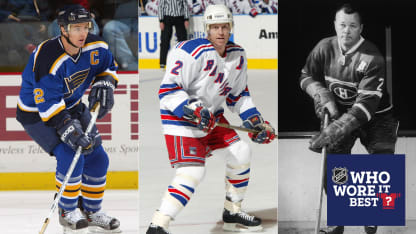I won't argue that Leetch and MacInnis were two of the greatest defensemen of all time, but I take Harvey for the championships on his resume and his historical significance. Yes, there were far fewer teams in his era, but in his 14 seasons with the Montreal Canadiens, he won the Stanley Cup six times and made the Final four other times, and this No. 2 was a big reason why. Harvey changed the way the position was played by controlling the puck rather than dumping it into the opposing zone and became one of the premier passers in the game. What puts him over the top for me is his individual achievements, as mentioned above, the seven Norris Trophy wins and 10 NHL First All-Star Team selections, each tied for second all time. Harvey, who wore No. 2 for 18 of his 19 seasons with the Canadiens, Rangers, Detroit Red Wings and the Blues, was also the first Montreal defenseman to have his number retired (Oct. 26, 1985).

